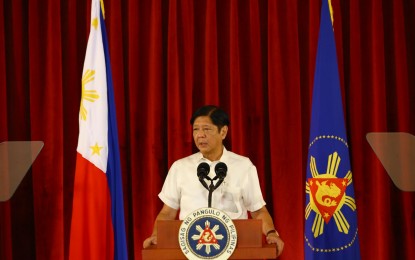
BUSINESS TRIP. President Ferdinand R. Marcos Jr. delivers his departure statement at Villamor Air Base in Pasay City on Friday (Dec. 15, 2023) before flying to Tokyo, Japan. Marcos is attending the 50th Commemorative ASEAN-Japan Friendship and Cooperation Summit. (PNA photo by Joan Bondoc)
MANILA – The Philippines will continue to adhere to peace and rules-based order but will forge strong alliances with allies to maintain regional stability, President Ferdinand R. Marcos Jr. said on Saturday.
In an interview with the Japanese media, Marcos said a more assertive China posed a real challenge to its neighbors in Asia.
“I’m afraid we’ll have to be able to say that tensions have increased rather than diminished for the past months or the past years and that’s why we have to -- but we continue to counsel peace and continue communication between the different countries -- everyone [who] is involved,” he said.
“And this has become -- I sometime(s) say, and I think it still applies, the South China Sea situation is the most complex geopolitical challenge that the world faces,” Marcos said.
Marcos said that with the raging Russia-Ukraine war, which he described as a tragedy, no country in the world wants to start a new conflict, especially in Asia.
He said these problems will also require new solutions.
“I cannot say that we have found the answer yet. We are still trying to formulate that answer as we speak. And things are moving very quickly in many parts of the China Sea and so there are changes in terms of approaches, [the aggravations],” he added.
Marcos also cited the importance of the increasing collaboration between the Philippines and Japan.
He said this is a “very good example of evolution.”
“This alliance that we have come together with Japan is again, is to show, to help us rather, work together more closely. Because in the military since there is a tactical operation that we really have to train with one another,” Marcos said.
“The so-called interoperability between the different forces and it doesn’t… it is not sufficient actually with just Japan and the Philippines to enter into this agreement. We really must get more of these kinds of arrangements in place,” he added.
It is about the trilateral agreement between the United States, Japan and the Philippines, Marcos said, adding there should be more of such agreements in place at both multilateral and bilateral levels.
“I think that really is the pattern that we are seeing to emerge and that is how we are evolving. And that is (a) very good example of evolution,” he said.
President Marcos is in Japan for the 50th Commemorative ASEAN-Japan Friendship and Cooperation Summit.
Energy exploration in WPS
In the same interview, Marcos said the Philippines is working to resolve the issue in the West Philippine Sea (WPS) to start new energy exploration projects before the Malampaya gas field starts to run out of supply.
“We are still at a deadlock right now. It is in a conflict area. So, that’s another thing that we have to try and resolve to see what role any countries play,” he said.
“It’s still of course the position of the Philippines that this is not in a conflict area. This is very clearly within our EEZ [exclusive economic zone]… within our baselines, within the maritime territory, the Philippines,” Marcos added.
Marcos admitted that while the Philippines has been in negotiation for over three years now, “very little progress” has been made with regard to the talks.
He also underscored the importance of the supply of liquefied natural gas (LNG).
“We are seeing LNG as being the transition between purely fossil fuel, coal, to the bigger mix of renewables,” Marcos said.
“But this, the move to renewables, I think we are all discovering is not as easy as we had hoped and so we need a transition period to give ourselves time to bring the infrastructure and to allow the technologies to develop,” he said.
Marcos said some of the new technologies are still being piloted so the country has to wait for them to be rolled out on a commercial basis and that will take a little time for the country’s transition to clean energy.
“The supply of reliable, affordable power is always going to be critical and it has been one of the problems that the Philippines has faced…. power and even the lack of supply,” he said. (PNA)
